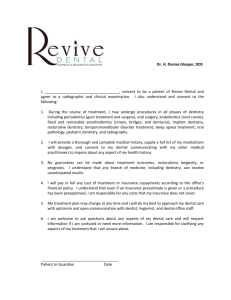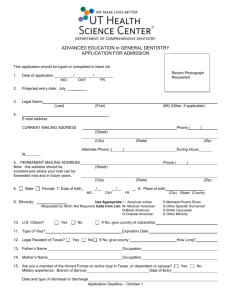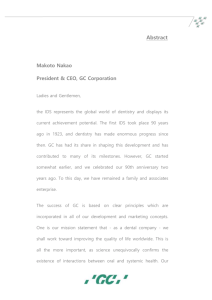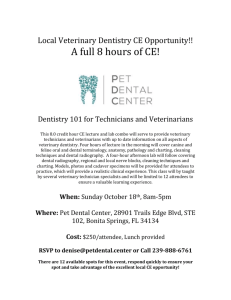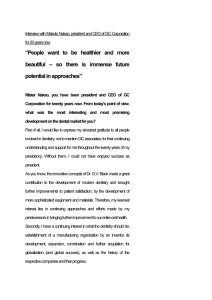Questions & Answers About DDS Admission
advertisement
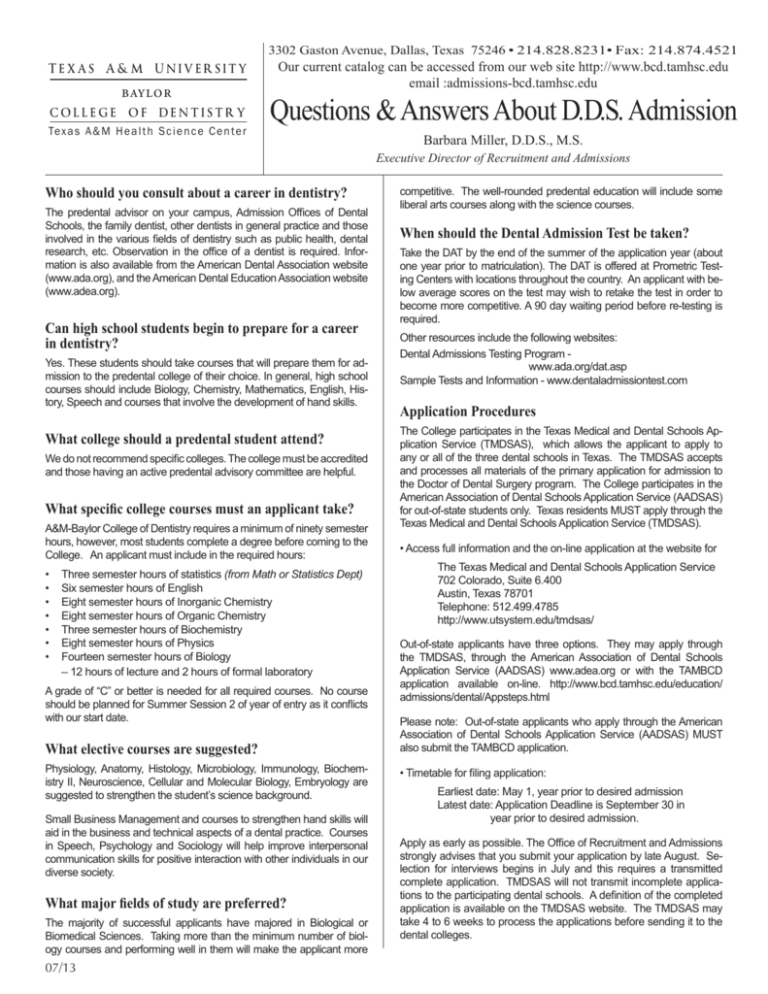
3302 Gaston Avenue, Dallas, Texas 75246 • 214.828.8231• Fax: 214.874.4521 TEXAS A&M UNIVERSITY baylor COLLEGE OF DENTISTRY Tex a s A & M H e a l t h S c i e n c e C e n t e r Our current catalog can be accessed from our web site http://www.bcd.tamhsc.edu email :admissions-bcd.tamhsc.edu Questions & Answers About D.D.S. Admission Barbara Miller, D.D.S., M.S. Executive Director of Recruitment and Admissions Who should you consult about a career in dentistry? The predental advisor on your campus, Admission Offices of Dental Schools, the family dentist, other dentists in general practice and those involved in the various fields of dentistry such as public health, dental research, etc. Observation in the office of a dentist is required. Information is also available from the American Dental Association website (www.ada.org), and the American Dental Education Association website (www.adea.org). Can high school students begin to prepare for a career in dentistry? Yes. These students should take courses that will prepare them for admission to the predental college of their choice. In general, high school courses should include Biology, Chemistry, Mathematics, English, History, Speech and courses that involve the development of hand skills. What college should a predental student attend? We do not recommend specific colleges. The college must be accredited and those having an active predental advisory committee are helpful. What specific college courses must an applicant take? A&M-Baylor College of Dentistry requires a minimum of ninety semester hours, however, most students complete a degree before coming to the College. An applicant must include in the required hours: • • • • • • • Three semester hours of statistics (from Math or Statistics Dept) Six semester hours of English Eight semester hours of Inorganic Chemistry Eight semester hours of Organic Chemistry Three semester hours of Biochemistry Eight semester hours of Physics Fourteen semester hours of Biology _ 12 hours of lecture and 2 hours of formal laboratory A grade of “C” or better is needed for all required courses. No course should be planned for Summer Session 2 of year of entry as it conflicts with our start date. What elective courses are suggested? Physiology, Anatomy, Histology, Microbiology, Immunology, Biochemistry II, Neuroscience, Cellular and Molecular Biology, Embryology are suggested to strengthen the student’s science background. Small Business Management and courses to strengthen hand skills will aid in the business and technical aspects of a dental practice. Courses in Speech, Psychology and Sociology will help improve interpersonal communication skills for positive interaction with other individuals in our diverse society. What major fields of study are preferred? The majority of successful applicants have majored in Biological or Biomedical Sciences. Taking more than the minimum number of biology courses and performing well in them will make the applicant more 07/13 competitive. The well-rounded predental education will include some liberal arts courses along with the science courses. When should the Dental Admission Test be taken? Take the DAT by the end of the summer of the application year (about one year prior to matriculation). The DAT is offered at Prometric Testing Centers with locations throughout the country. An applicant with below average scores on the test may wish to retake the test in order to become more competitive. A 90 day waiting period before re-testing is required. Other resources include the following websites: Dental Admissions Testing Program www.ada.org/dat.asp Sample Tests and Information - www.dentaladmissiontest.com Application Procedures The College participates in the Texas Medical and Dental Schools Application Service (TMDSAS), which allows the applicant to apply to any or all of the three dental schools in Texas. The TMDSAS accepts and processes all materials of the primary application for admission to the Doctor of Dental Surgery program. The College participates in the American Association of Dental Schools Application Service (AADSAS) for out-of-state students only. Texas residents MUST apply through the Texas Medical and Dental Schools Application Service (TMDSAS). • Access full information and the on-line application at the website for The Texas Medical and Dental Schools Application Service 702 Colorado, Suite 6.400 Austin, Texas 78701 Telephone: 512.499.4785 http://www.utsystem.edu/tmdsas/ Out-of-state applicants have three options. They may apply through the TMDSAS, through the American Association of Dental Schools Application Service (AADSAS) www.adea.org or with the TAMBCD application available on-line. http://www.bcd.tamhsc.edu/education/ admissions/dental/Appsteps.html Please note: Out-of-state applicants who apply through the American Association of Dental Schools Application Service (AADSAS) MUST also submit the TAMBCD application. • Timetable for filing application: Earliest date: May 1, year prior to desired admission Latest date: Application Deadline is September 30 in year prior to desired admission. Apply as early as possible. The Office of Recruitment and Admissions strongly advises that you submit your application by late August. Selection for interviews begins in July and this requires a transmitted complete application. TMDSAS will not transmit incomplete applications to the participating dental schools. A definition of the completed application is available on the TMDSAS website. The TMDSAS may take 4 to 6 weeks to process the applications before sending it to the dental colleges. Baylor College of Dentistry requires the submission of a secondary application. This application can be accessed from links on the TMDSAS website or at the following web address: http://www.bamf.tamhsc.edu/2 THE APPLICATION FOR ADMISSION IS NOT COMPLETE UNTIL THE SECONDARY APPLICATION IS SUBMITTED. Is a campus visit possible? Yes, tour days are scheduled during the spring. Please call or email to book a tour. Also, the College gladly provides complete information and counseling for all prospective students by email or phone. On what basis are students accepted? The quality of academic achievement is the first point of consideration. The grade point average (GPA) and the Dental Admission Test (DAT) are the primary factors used in this evaluation. The interview with the Admissions Committee gives the opportunity for evaluation of noncognitive factors. Preference is given to residents of Texas and the surrounding states which do not have a college of dentistry. Consideration of any factors that may have impacted academic or personal history is important in interview selection and final acceptance decisions. Consideration is also given to how the student may contribute to the diversity of the class. What can one do to improve chances for admission? The application for admission to A&M-Baylor College of Dentistry may be strengthened by the following: • keep the GPA as high as possible • make above average scores in all areas of the DAT • upper division biological science courses similar to those taken by the first-year dental students • give careful attention to details in filing the application - apply early • assure your personal statement explains your motivation for pursuing dentistry, including personal and academic achievements, hardships overcome and other factors that affected personal or academic progress • observation in a general practice dental office is required • participate in activities to improve manual dexterity • take advantage of opportunities for community service • evaluate and be able to articulate your skills, abilities, attitudes, etc. to determine if you are motivated to make the commitment required for a career in dentistry What does the Admissions Committee look at when they do a ‘whole-file review’ of an application? A comprehensive (whole-file) review of the application is performed to reveal characteristics critical to the practice of dentistry, factors that indicate success in the dental curriculum that are not evident from academic history or standardized test performance, and potential for future contributions to the dental profession. They include: • • • • • • • • • • • • • • • • Motivation to pursue a career in dentistry. Involvement in community service. Observation or involvement in a dental office or clinic. Involvement in a summer pre-dental preparatory program. Letters of evaluation. Communication capabilities including writing (as evidenced in personal statement) and conversational English proficiency. The applicant’s ability to contribute to the diversity of the class including their race or ethnicity, socioeconomic background, talents, life skills and experiences and special attributes. Region in Texas, in which applicant resides. Employment while attending college. Residence in Texas county designated as underserved by dental health professionals. Preparation to attend and succeed in post-secondary education. Applicant is first college attendee in his/her immediate family. History of extreme hardship. Leadership positions held in societies or organizations. Evidence of diverse cultural experience. Multilingual capabilities. How can a re-applicant become more competitive? • All re-applicants must be enrolled in coursework to be considered as a competitive candidate. We recommend taking post bac coursework in the biological sciences to further prepare for the dental school curriculum, keep current with study skills and prove to the Admissions Committee the applicant’s motivation and preparedness. (for example: anatomy, physiology, biochemistry II, microbiology, histology, neuroscience, cell & molecular biology, immunology) • Re-applicants need to critically review their applications for areas that may need further work: biological science coursework, DAT scores, GPA, community service and volunteer work, general dental office shadowing experience. • Re-applicants should continue to participate in shadowing and on-going volunteer activities during the application cycle. • Re-applicants who follow this advice to improve their academic background and general application will be more competitive than those with little change from year to year. • Working in a dental office alone will not improve the applicant’s competitiveness. What is the cost to attend A&M-Baylor College of Dentistry? The tuition and fees for the student in the college are recommended by the administration and are approved by the Board of Regents. Education Costs: (Estimates 2013-2014) Texas resident, per semester ...........................................................$2,700.00 Nonresident, per semester ...............................................................$8,100.00 Designated Tuition, per semester ....................................................$2,700.00 Differential Tuition, per semester .....................................................$2,250.00 Summer Clinic Fee ........................................................................... $500.00 Instrument Leasing, per year ...........................................................$5,000.00 Tuition refund policy is available on request and is published in our catalog. For a complete listing of tuition and fees, see the Health Science Center Catalog available on the web site at www.bcd.tamhsc.edu. Students are discouraged from employment which may be detrimental to the pursuit of their education. In no case may a student accept a position which conflicts with regularly scheduled school hours. When scholastic progress is questionable, students may be asked to discontinue outside work. Are loan funds available? Yes, the College participates in several types of loan and scholarship programs. Students are classified as independent for consideration in professional school. Students complete FAFSA and submit requests for aid to the Office of Student Aid. What is the attrition rate? Because of the intense efforts in selecting only highly qualified students, few students fail to complete our programs. Are there summer predental programs available? A Summer Predental Enrichment Program exists to introduce the profession of dentistry, strengthen academic background, improve in study skills and increase competitiveness for admission to dental school. For information contact the Office of Student Development. Web address www.bcd.tamhsc.edu/education/studentdevelopment/index.html What opportunities exist beyond general practice? Most D.D.S. graduates are in the private practice of dentistry. There is also a need for dentists who are interested in scientific research and teaching. Specialty areas in dentistry include Dental Public Health, Endodontics, Oral and Maxillofacial Pathology, Oral and Maxillofacial Radiology, Oral and Maxillofacial Surgery, Orthodontics, Pediatric Dentistry, Periodontics, and Prosthodontics. Competition for admission to these graduate programs is high. Dentists also serve in public health agencies, educational institutions, government services and industrial clinics.

